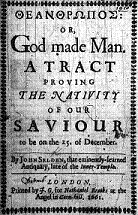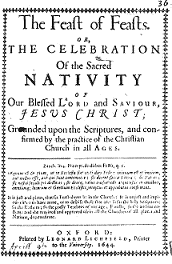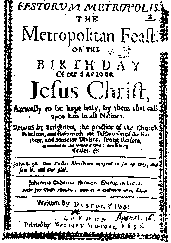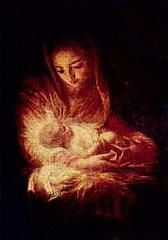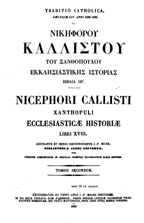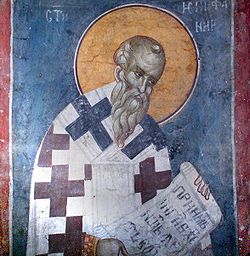FOR THE FEAST OF THE NATIVITY
Sermon 190
(1) Our Lord Jesus, who was with the Father before He was born
of His Mother, chose not only the Virgin of whom He was born,
but also the day on which His birth took place. Men subject to
error very often choose days: one for planting, another for
building, another for making a journey, and still another for
contracting marriage. When a man so chooses, he is motivated by
the hope that successful issue may come from his undertaking. No
one, however, can choose the day of his birth. But Christ the
Lord was able both to create and to select the day of His birth.
Nor did He make His choice as they do who foolishly determine
the fates of men by the arrangement of the stars. He who was
born was not rendered blessed by being born on a particular day,
but He made that day blessed on which He deigned to be born. The
day of His nativity holds the mystery of His light, for the
Apostle says: 'The night is far advanced; the day is at hand.
Let us therefore lay aside the works of darkness, and put on the
armor of light. Let us walk becomingly as in the day.'[1]
Let us recognize the day and let us be as the day, for we were
in darkness when we lived unfaithfully. Since that infidelity
which had covered the whole world with the darkness of night had
to be lessened by an increase of faith, therefore, on the
birthday of our Lord Jesus Christ, night began to suffer
diminution and day began to increase. And so, my brethren, let
us hold this day as sacred, not as unbelievers do because of the
material sun, but because of Him who made the sun. For, He who
was the Word became flesh so that for our sake He might live
under the light of the sun. He was incarnate beneath the sun,
but in majesty He was above the entire universe in which He had
placed the sun. Now, in truth, even in the flesh He is above the
sun which is worshiped as a god by those who, blinded in mind,
do not see the true Sun of Justice.
(2) Let us, O Christians, celebrate this feast, not of the
divine nativity of the Lord, but of His human nativity when He
became one of us so that through the invisible made visible we
might pass to the invisible from the visible. For we of the
Catholic faith ought to hold that there are two births of the
Lord: the one divine, and the other human; the one timeless, and
the other in time. Both nativities are marvelous: the one,
without a mother; and the other, without a father. If the one is
incomprehensible, the other is inexplicable. Who could
understand this strange, extraordinary happening, unique in the
history of the world, wherein the unbelievable became believable
and in unbelievable fashion was entrusted to the whole world;
namely, that a virgin would conceive and would bear and bring
forth a Son, while remaining a virgin? What human reason does
not grasp faith lays hold on; and where human reason fails faith
succeeds. For who would say that the Word of God, by whom all
things were made, could not have taken flesh even without a
mother, just as He made the first man without father and mother?
However, since He had created both sexes, that is, male and
female, He wished to honor, in His birth, both sexes which He
had come to save. You know well that the first man fell because
the Serpent, not daring to address the man, used the help of a
woman to encompass man's ruin. Through the weaker sex he gained
the stronger and, worming his way in through the one, he
triumphed over both. Therefore, so that we would not be able to
shudder with a sentiment of justifiable grief at our death in
this woman, Eve, and to believe ourselves irreparably condemned,
when the Lord came to seek what was lost, He wished to approve
both sexes by honoring both because both had been ruined. In
regard to neither sex, then, should we do injury to the Creator;
the nativity of the Lord encouraged both to hope for salvation.
The glory of the male sex is in the humanity of Christ; the
glory of womanhood is in the Mother of Christ. The grace of
Jesus Christ has worsted the wile of the Serpent.
(3) Therefore, let both sexes be reborn in Him who was born
today and let both celebrate this feast on which the Lord
Christ, far from beginning to exist since He had always existed
with His Father brought forth into the light of day the human
nature which He had received from His Mother when He granted her
fertility without depriving her of integrity. He is conceived
and born; He is an Infant. Who is this Infant whom we so call
because He is not able to speak? He is both a speechless Child
and He is the Word. In His humanity, He is silent; through His
angels, He teaches. The Leader and Shepherd of shepherds is
announced to shepherds, and the food of the faithful lies in the
manger of dumb beasts. For the Prophet had predicted: 'The ox
knoweth his owner, and the ass his master's crib.'[2]
For that reason He sat upon the colt of an ass when He entered
Jerusalem amid the praises of the multitude surging around and
before Him.[3]
Let us understand; let us draw near to the manger; let us eat of
this food; let us bear the Lord, our Guide and Leader so that
under His direction we may come to the heavenly Jerusalem. The
birth of Christ from His Mother is subject to human weakness,
but from His Father He has unlimited majesty. In these fleeting
days of ours He lives for a brief span but He is the Eternal Day
born of Eternal Day.
Rightly, then, are we stirred by the voice of the Psalmist as by
the sound of a heavenly trumpet, when we hear: 'Sing ye to the
Lord a new canticle: sing to the Lord all the earth. Sing ye to
the Lord and bless His name.'[4]
Let us recognize, then, and proclaim the 'Day born of the Day'
who became incarnate on this day. The Day is the Son born of the
Father, the Eternal Day, God of God, Light of Light; He is our
Salvation, of whom the Psalmist says elsewhere: 'May God have
mercy on us, and bless us: may He cause the light of his
countenance to shine upon us ... That we may know thy way upon
earth: thy salvation in all nations.'[5]
The idea expressed in 'upon the earth' he expanded to 'in all
nations' and the significance of 'thy way' he repeated in 'thy
salvation.' We recall that the Lord Himself said: 'I am the
way.'[6]
And only recently, when the Gospel was read, we heard that the
thrice-blessed old man, Simeon, had received a divine promise
that he would not experience death until he had seen Christ the
Lord and that, when he had taken the infant Christ into his
hands and had recognized the mighty little One, he said: 'Now
thou dost dismiss thy servant, O Lord, according to thy word, in
peace; Because my eyes have seen thy salvation.'[7]
Gladly, then, let us announce His salvation, this Day born of
the Eternal Day, let us declare 'his glory among the Gentiles:
his wonders among all people.'[8]
He lies in a manger but He holds the world in His hand; he is
nourished at the breast but He feeds the angels; He is wrapped
in swaddling clothes but He clothes us with immortality; He is
suckled but is adored; He does not find room in the inn but He
makes a temple for Himself in the hearts of believers. For
Strength took on weakness that weakness might become strong.
Therefore, let us marvel at rather than despise His human birth;
from it let us learn the lowliness which such loftiness assumed
for our sake. Then let us enkindle our love so that we may come
to His eternal day.
[1]
Rom. 13.12.
[2]
Isa. 1.3.
[3]
Cf. Matt. 21:9.
[4]
Ps, 95.1-3.
[5]
Ps. 66.2.
[6]
John 14.6.
[7]
Luke 2.29-31.
[8]
Ps. 95.2-4.
______________________________
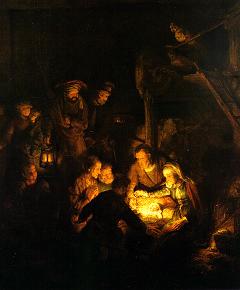
Adoration of the Shepherds
All rights reserved.
 John Seleden’s
John Seleden’s